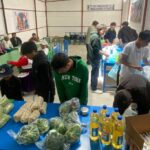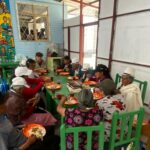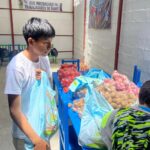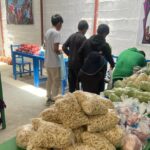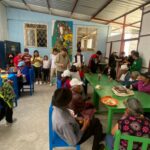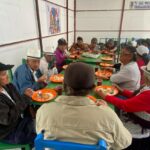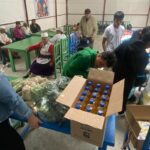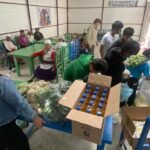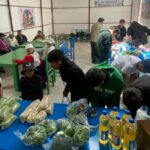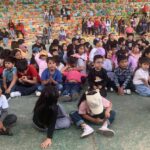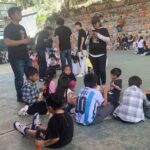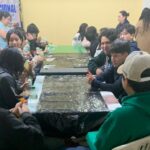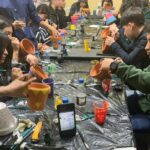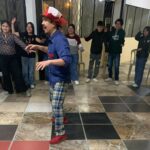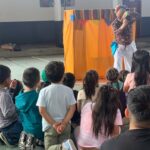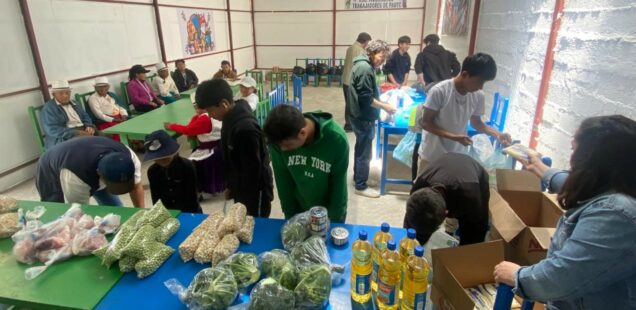
The working children of Paute keep-up their solidarity association – they learn, enjoy some recreation and assist the disadvantaged elders in their community
With the indispensable cooperation of Fastenaktion of Switzerland and CECCA (Centro de Educación y Capacitación Campesina del Azuay) of Ecuador, the Feyerabend Foundation has elected as his only initiative in 2025 the provision of support to the Association of Muchachos Trabajadores (Working Children) of Paute, Ecuador. This was also the last initiative formally under the name of the Foundation (a separate article describes our forced closure). Founded in 1997, the association of Muchachos Trabajadores unites disadvantaged children— including orphans, children whose parents migrated to foreign countries or children from extremely poor families— obliged to work from a very early age. The children are not formally employed but part of the informal economy (for instance they gain as shoe shiners, tricycle drivers, porters, market vendors, etc.). Too often, the children are also victims of violence, diseases, loneliness and very poor access to schooling. When they become members of the Association of Muchachos Trabajadores, the children commit themselves to mutual solidarity and solidarity with their communities at large.
An initiative of solidarity with the community at large regards the provision of food to abandoned elderly people. In Ecuador the phenomenon of abandoned elderly people is unfortunately as common as the one of children and adolescents forced to work odd jobs in order to survive. A main cause of this is the breakdown of families due to separation, divorce, or the economic migration of one or both spouses. As migrants leave, and often form new households abroad, their children and grandchildren are left in the care of grandparents and siblings, who also feel abandoned themselves. As these problems grew in the last decades, the culture of the Azuay region has also become more urban, consumption-oriented, and progressively dominated by the messages of media and the virtual world… the spaces for family encounters and personal relationships have shrunk everywhere.
The social situation is well described by the following excerpts from a letter to the Foundation by Father Hernàn Rodas: “…In most families, even poor ones, each family member has a mobile phone, there are two or three televisions depending on the family members’ favourite programmes, cartoons, electronic games, sports, music… even the children clamour for their own device. They often live together without talking or sharing anything, as mobile phones concentrate their attention […] The absence of the parents who migrated, problems with alcoholism and financial difficulties, tensions and violence with teenagers who do not accept any discipline or values lead the elders to lose the ability to govern the home. When children study, some feel superior to their parents or grandparents who do not know how to use the television, computer, internet or platforms… and the adults become resentful. Meanwhile, the new generations feel ‘modern’ because they dress differently, have different accessories, celebrate different holidays, speak and consume differently […] Overall, the young face instability, lack of opportunities to study and work, an atmosphere of violence both at home and in society, and the perverse logic of drug gangs that select, train, and guide adolescents and children for their armed confrontations. On their side, the elders feel excluded, useless, unable to deal with their family, unloved, and misunderstood. Many fall into a state of depression and, in some cases, commit suicide.”
The number of members in the association of the Muchachos Trabajadores of Paute has varied with the years, but about 40 to 50 regularly attend the weekly meetings. They are boys and girls between the ages of 6 and 17, and 620 children have participated during the association’s lifetime. They have their own governance committee and the support of Father Hernan Rodas and Ms. María Barrera from the Paute community. Every week, the children meet for a common meal and to prepare a food bag with basic products— vegetables, meat, fruits— that they later distribute to the needy elders in the community. For that, they also collaborate with the local market run by the Paute’s women’s association.
All children who become members of the Association of Muchachos Trabajadores are required to study and several of them are now university students or started their own productive enterprises. The children in the association are not asked to stop working, as their activities often provide financial resources that significantly contribute to the family economy (normally between 5 and 25 dollars a week, when the parents’ income is about 50 dollars a week). While the time devoted to work reduces the children’s opportunities for study and play, stunting their time of youth, work helps them to mature early and supports in them a sense of responsibility and self-esteem. Finding the right balance is essential… and the association does its best to accompany the children in their physical, emotional, intellectual and affective growth. For instance, all children are encouraged to share their own histories and learn skills to deal with conflicts and find solutions to their problems. In the summer, the association helps the children to participate in seaside recreation and offers occasions to develop capacities during full-immersion workshops.
As part of the initiative supported by the Feyerabend Foundation in 2025, about 200 children have enjoyed a summer vacation and were trained in numerous workshops that focused on music, painting, theatre, dance, ecology, productive activities, psychology, conflict management, puppetry, ceramics, etc. Resources were also used to help several children to attend school and to buy the food that the association pulls together every week to deliver to the abandoned elders in the community.


